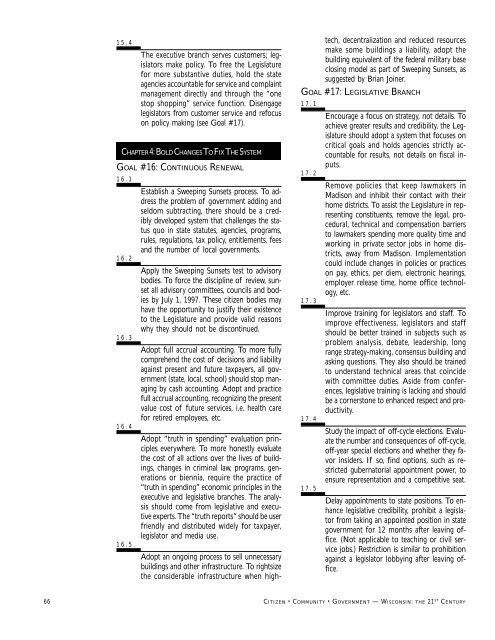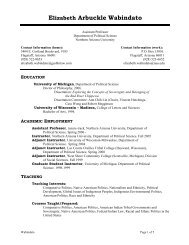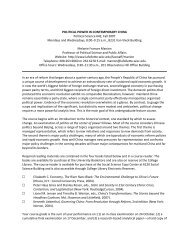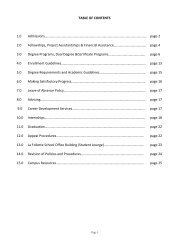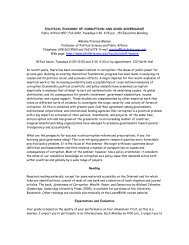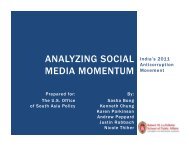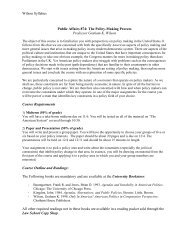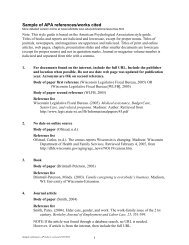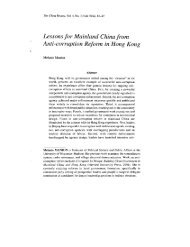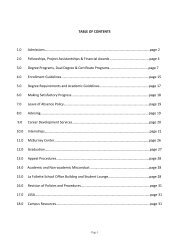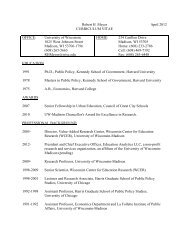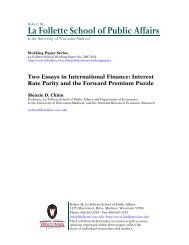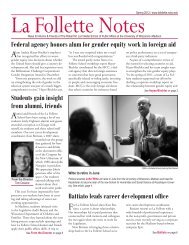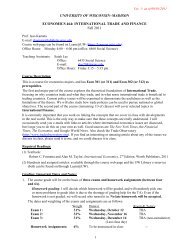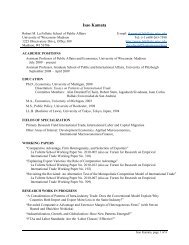SAVE Commission's findings - La Follette School of Public Affairs ...
SAVE Commission's findings - La Follette School of Public Affairs ...
SAVE Commission's findings - La Follette School of Public Affairs ...
You also want an ePaper? Increase the reach of your titles
YUMPU automatically turns print PDFs into web optimized ePapers that Google loves.
15.4<br />
The executive branch serves customers; legislators<br />
make policy. To free the Legislature<br />
for more substantive duties, hold the state<br />
agencies accountable for service and complaint<br />
management directly and through the “one<br />
stop shopping” service function. Disengage<br />
legislators from customer service and refocus<br />
on policy making (see Goal #17).<br />
CHAPTER 4: BOLD CHANGES TO FIX THE SYSTEM<br />
GOAL #16: CONTINUOUS RENEWAL<br />
16.1<br />
Establish a Sweeping Sunsets process. To address<br />
the problem <strong>of</strong> government adding and<br />
seldom subtracting, there should be a credibly<br />
developed system that challenges the status<br />
quo in state statutes, agencies, programs,<br />
rules, regulations, tax policy, entitlements, fees<br />
and the number <strong>of</strong> local governments.<br />
16.2<br />
Apply the Sweeping Sunsets test to advisory<br />
bodies. To force the discipline <strong>of</strong> review, sunset<br />
all advisory committees, councils and bodies<br />
by July 1, 1997. These citizen bodies may<br />
have the opportunity to justify their existence<br />
to the Legislature and provide valid reasons<br />
why they should not be discontinued.<br />
16.3<br />
Adopt full accrual accounting. To more fully<br />
comprehend the cost <strong>of</strong> decisions and liability<br />
against present and future taxpayers, all government<br />
(state, local, school) should stop managing<br />
by cash accounting. Adopt and practice<br />
full accrual accounting, recognizing the present<br />
value cost <strong>of</strong> future services, i.e. health care<br />
for retired employees, etc.<br />
16.4<br />
Adopt “truth in spending” evaluation principles<br />
everywhere. To more honestly evaluate<br />
the cost <strong>of</strong> all actions over the lives <strong>of</strong> buildings,<br />
changes in criminal law, programs, generations<br />
or biennia, require the practice <strong>of</strong><br />
“truth in spending” economic principles in the<br />
executive and legislative branches. The analysis<br />
should come from legislative and executive<br />
experts. The “truth reports” should be user<br />
friendly and distributed widely for taxpayer,<br />
legislator and media use.<br />
16.5<br />
Adopt an ongoing process to sell unnecessary<br />
buildings and other infrastructure. To rightsize<br />
the considerable infrastructure when hightech,<br />
decentralization and reduced resources<br />
make some buildings a liability, adopt the<br />
building equivalent <strong>of</strong> the federal military base<br />
closing model as part <strong>of</strong> Sweeping Sunsets, as<br />
suggested by Brian Joiner.<br />
GOAL #17: LEGISLATIVE BRANCH<br />
17.1<br />
Encourage a focus on strategy, not details. To<br />
achieve greater results and credibility, the Legislature<br />
should adopt a system that focuses on<br />
critical goals and holds agencies strictly accountable<br />
for results, not details on fiscal inputs.<br />
17.2<br />
Remove policies that keep lawmakers in<br />
Madison and inhibit their contact with their<br />
home districts. To assist the Legislature in representing<br />
constituents, remove the legal, procedural,<br />
technical and compensation barriers<br />
to lawmakers spending more quality time and<br />
working in private sector jobs in home districts,<br />
away from Madison. Implementation<br />
could include changes in policies or practices<br />
on pay, ethics, per diem, electronic hearings,<br />
employer release time, home <strong>of</strong>fice technology,<br />
etc.<br />
17.3<br />
Improve training for legislators and staff. To<br />
improve effectiveness, legislators and staff<br />
should be better trained in subjects such as<br />
problem analysis, debate, leadership, long<br />
range strategy-making, consensus building and<br />
asking questions. They also should be trained<br />
to understand technical areas that coincide<br />
with committee duties. Aside from conferences,<br />
legislative training is lacking and should<br />
be a cornerstone to enhanced respect and productivity.<br />
17.4<br />
Study the impact <strong>of</strong> <strong>of</strong>f-cycle elections. Evaluate<br />
the number and consequences <strong>of</strong> <strong>of</strong>f-cycle,<br />
<strong>of</strong>f-year special elections and whether they favor<br />
insiders. If so, find options, such as restricted<br />
gubernatorial appointment power, to<br />
ensure representation and a competitive seat.<br />
17.5<br />
Delay appointments to state positions. To enhance<br />
legislative credibility, prohibit a legislator<br />
from taking an appointed position in state<br />
government for 12 months after leaving <strong>of</strong>fice.<br />
(Not applicable to teaching or civil service<br />
jobs.) Restriction is similar to prohibition<br />
against a legislator lobbying after leaving <strong>of</strong>fice.<br />
66 CITIZEN • COMMUNITY • GOVERNMENT — WISCONSIN: THE 21 ST CENTURY


